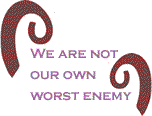How
many times have you heard someone of African ancestry say
that “We [Black people] are our own worst enemy?” If you
have lived among African people in this country for any
length of time, I am sure you have heard this remark made
many times.
Unfortunately,
the system of white supremacy developed in the western world,
has caused far too many African people in America
to believe that the problem we face as a people is “us.”
We must remind ourselves, time and time again, that African
people in America were captured from Africa and brought to
America
against our will. As the “1974 Black Capital” article asserted,
“Our introduction to the West was in the form of a commodity
raped from Africa to be used as labor, capital, chattel, and currency to build
a nation for someone else.” In the article, it explained
that “... our history tells us that we were below slaves
and less than human. We were things who were traded for
horses, our women used as breeders and our children raised
like chickens.”

Finally,
the “Black Capital” article pointed out that during the
slavery process - “The level of our existence was based
upon the skill and the will of those who owned us. They
had the right to deem that which was best for their property.
Therefore, the profit motive and the skill of the slave
master determined how this Black wealth would bring the
highest return on his investment.”
This
formula is still at work today. Just examine the role of
African people in the entertainment and athletic industry.
White people own and control these industries and use African
people to “bring the highest return off their investment.”
If
African people are going to ever have a serious mental breakthrough
in terms of how we analyze our condition in America,
we will have to resolve the question “are we our own worst
enemy,” or has the system of white supremacy created a set
of conditions that continues to keep us in an oppressed
state?
We
must accept responsibility for answering this question as
well as accepting responsibility for solving all the problems
we face as a people. But in accepting responsibility for
addressing the problems we face as an African people in
America,
we must have a framework out of which to properly conceptualize
our problems.
In
1852, the great African thinker in America,
Dr. Martin R. Delany, wrote one of the most important books
that accurately described our condition at that moment in
history that is still applicable to our condition today.
The title of the book is The Condition Elevation Emigration and Destiny of the Colored
People of the United States.
 Delany
wrote, “Unfortunately for us a body, we have been taught
that we must have some person to think for us, instead of
thinking for ourselves. So accustomed are we to submission
and this kind of training, that it is with difficulty, even
among the most intelligent of the colored people, an audience
may be elicited for any purpose whatever, if the expounder
is to be colored...” Delany
wrote, “Unfortunately for us a body, we have been taught
that we must have some person to think for us, instead of
thinking for ourselves. So accustomed are we to submission
and this kind of training, that it is with difficulty, even
among the most intelligent of the colored people, an audience
may be elicited for any purpose whatever, if the expounder
is to be colored...”
Further
Delany wrote, “… and the introduction of a subject is treated
with indifference, if not contempt, when the originator
is a colored person. Indeed, the most ordinary white person,
is almost revered while the most qualified colored person
is totally neglected, nothing from them is appreciated.”
In
resolving the question of whether “we are our own worst
enemy,” we should reflect that for over three hundred years
white people openly discussed African people as a problem
(1600 - 1900). Today they still discuss us as a problem
but the language is coded differently.
As
Dr. Anderson Thompson has written on the discussions that
white people have had on what they have historically called
“the Negro Problem,” “There is a duality in the story of
western white man and his culture, which, paradoxically,
is thrown into sharp relief wherever the Black man appears
(or is dropped) on the scene.” Dr. Thompson says, “Whenever
or wherever the white man exists in proximity to the Blacks
the Negro Question appears.”
The
idea of the “Negro Question” is discussed further when Dr.
Thompson writes, “The Negro Question in Western society
has been a perennial subject of endless international debates,
actions, decisions, wars, riots, lynching’s - all of which
flow out a recurring western dialogue: a conversation (for
Europeans only) which for a long time took place between
white men over what should be done with, about or to the
Blacks they found in their captured territories.”

Concluding
on this point, Dr. Thompson informs us “The International
Negro Question, or Nigger Question has, for the most part,
been an integral past of European Civilization. Wherever
in the world there existed Europeans in proximity to the
African, inevitably the question arose as to how (not why,
nor whether) the Black man should be exploited or should
be eliminated.”
We
are not our own worst enemy - even though some African people
in this country behave in manners that are not in our best
interest. What we must continue to do is to understand this
negative African behavior and assume responsibility for
changing it. The enemy and problem is white supremacy and
its continued impact on us.
BlackCommentator.com
Columnist, Conrad W. Worrill, PhD, is the National Chairman
of the National Black United Front (NBUF). Click here
to contact Dr. Worrill.

|

